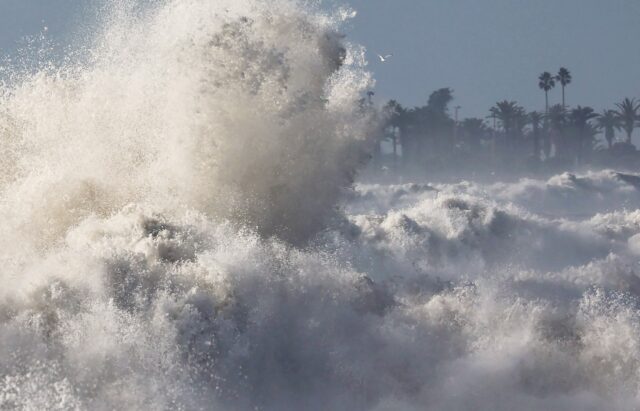Huge surf was battering the US West Coast on Friday, with forecasters warning of more danger ahead after a rogue wave swept pedestrians off their feet and swamped a hotel.
Rollers as high as 30 feet (nine meters) were expected to lash parts of California and Oregon as a powerful storm capped a year of wild — and often wet — weather for the region.
Ventura County, just north of Los Angeles, took a walloping on Thursday, with several people hurt.
Video footage showed the dramatic moment a huge wave overtopped a sea wall in Ventura city, knocking several bystanders off their feet and sending others scurrying for safety.
“Because of this wave eight people were transported to local hospitals,” Ventura County Fire wrote on social media.
The Los Angeles Times reported the nearby Inn on the Beach boutique hotel was inundated with two feet of water, with the waves smashing glass and tossing furniture around.
The National Weather Service (NWS) warned of “extremely dangerous conditions.”
“Powerful waves and life-threatening rip currents pose an exceptional risk of ocean drowning and damage to coastal structures.”
Forecasters said high surf was anticipated all along the coast, with some flooding possible through Saturday evening.
“Flooding of sea water is likely, around the time of high tide, over vulnerable low-lying coastal areas such as parking lots, beaches, and walkways,” the NWS said.
While weather watchers were not expecting major damage, they warned the sea would be very dangerous.
“There is an increased risk for ocean drowning. Rip currents can pull swimmers and surfers out to sea,” the NWS said.
“Large breaking waves can cause injury, wash people off beaches and rocks, and capsize small boats near shore.”
Firefighters and public works officials were Friday shoring up beaches in Ventura.
Video footage showed earthmovers building a large berm to protect coastal homes, as officials set up sites where residents could pick up sandbags to protect against flooding.
The waves were being generated by a storm that was also bringing heavy rain to areas further inland, as well as the chance of a decent snowfall over the Sierra Nevada during the weekend.
The storm is the latest episode in a year of wild weather in the US West, which was hit by a fierce heatwave in July.
That came after one of the wettest winters on record.
A series of atmospheric rivers — high altitude ribbons of moisture — chugged in, dropping trillions of gallons (liters) of water on a landscape that had been baked dry by years of punishing drought.
Reservoirs that had been perilously low drank their fill, and rivers burst their banks.
Scientists say that as humanity continues to warm the planet by burning fossil fuels, the weather patterns we have known for generations will become more unpredictable.
That will mean wetter and more powerful storms, along with hotter, drier periods that will strain our water resources.

COMMENTS
Please let us know if you're having issues with commenting.